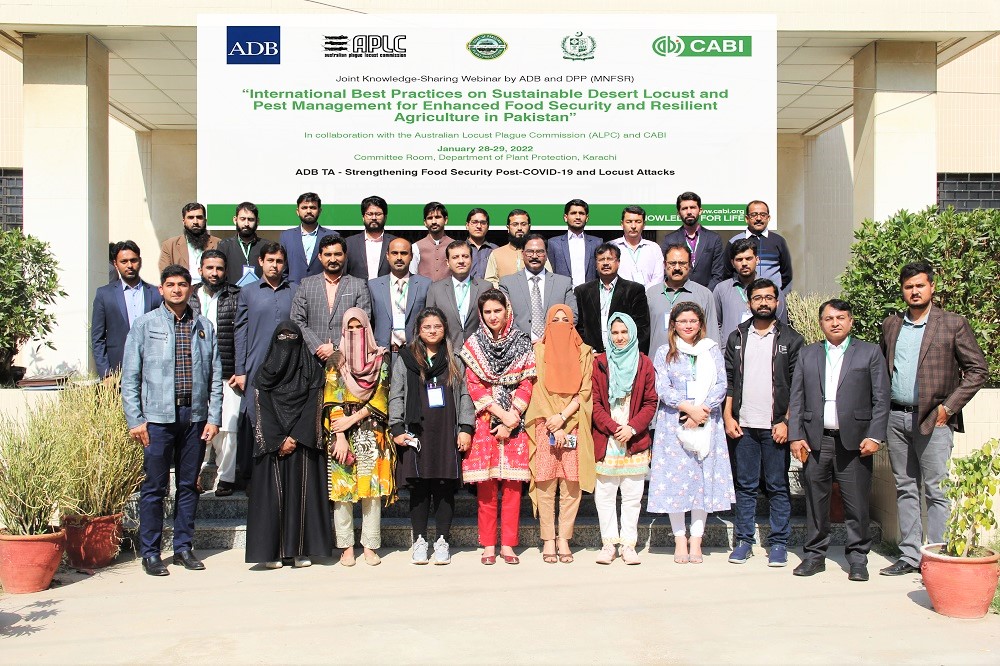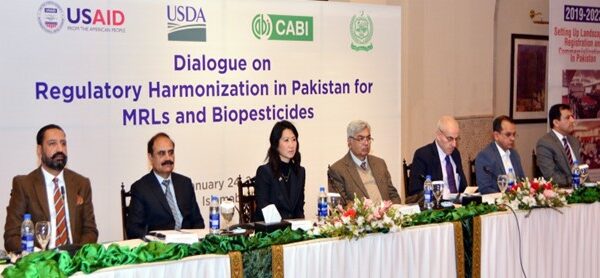
A high-level two-day joint-knowledge sharing webinar has been held at the Department of Plant Protection (DPP) in Karachi, Pakistan, to address international best practices and sustainable ways of fighting desert locust and other crop pests to help ensure the country’s food security.
The webinar was jointly arranged by Asian Development Bank (ADB), CABI’s centre in Pakistan, the Australian Plague Locust Commission (APLC) and Ministry of National Food Security and Research (MNFSR) through the DPP project ‘Strengthening Food Security Post-COVID-19 and Locust Attacks.’
The main subject of the webinar was global best practices experience sharing and preparedness for response to desert locust attacks in future. The event was graced by the virtual presence of Honourable Syed Fakhar Imam, Federal Minister, Ministry of National Food Security and Research and Mr Yong Ye, ADB country Representative in Pakistan.
The event was also virtually participated by Noriko Sato, Senior Natural Resources Specialist of ADB and TA Officer for the project, Dr Munawar R. Kazmi, Country Manager Pakistan, Dr Babar E. Bajwa, Senior Regional Director Asia (CABI), delegates from the APLC, the Australian Centre for International Agricultural Research (ACIAR), and other dignitaries.
The Federal Minister thanked ADB, APLC, CABI and DPP for jointly arranging the webinar on global best practices experience sharing. He mentioned that locust attacked the country after 27 years and described the key steps taken by the Federal Government during and after the locust attack. The minister mentioned that Pakistan is ranked among the 10 most vulnerable countries to climate change. He added that the support of the international community with Pakistan is an example of great cooperation and a National Action Plan is being developed and implemented in all the provinces through National Locust Control Centre (NLCC).

Speaking on the occasion, the representative of ADB country director, welcomed the participants to the knowledge-sharing webinar and warned that although the recent locust plague is over, they may again up-surge whenever the weather conditions are conducive.
He shared that other countries are adopting 21st century pest management systems for ensuring high-quality safe agricultural products. He added that increasingly Pakistan’s export sector must meet the latest standards if its products are to be welcomed in world markets.
Ms Noriko Sato, Senior Natural Resources Specialist, ADB, presented the overview of ADB’s support to food security and agriculture in Pakistan. She specifically mentioned the objectives of ADB’s current knowledge and technical assistance support for MNFSR. This includes four provincial agricultural areas who are being supported in adopting technologies and advance practices to manage the impact of COVID-19, locust attacks and climate change, on agriculture productivity and the value chain. She informed that the event is supported by valuable contributions by the Government of The Netherlands and others.
The officials of Provincial Agriculture Extension Departments also graced the occasion and shared their experiences and operations to combat the locust upsurge during 2019-20. In the technical session, ADB’s economists highlighted the impact on farm households in Pakistan. They concluded that long term investment is needed for the capacity building of government officers, farmers and non-government entities. The experience and lessons learnt on locust management during 2019-20 was shared by Dr Riffat Sultana.
Dr Chris Adriaansen, Director of APLC, Dr David Hunter and Mr Heath McRae, also of the APLC, presented the technical talks during the second day of the webinar. They covered the various technical areas including international best practices on locust and pest management and the national system, the principles of sustainable pest monitoring and management, the locust biology, ecology in locust surveillance and treatment programmes and key aspects of international best practices in locust management and its application to Pakistan.

All the participants and young entomologists from DPP showed great interest and gave positive feedback for all the technical material presented during the technical sessions. The joint efforts and contributions of DPP, ADB and CABI for knowledge and support technical assistance in developing a Sanitary and Phytosanitary (SPS) strategy were also presented in detail.
Improvements in the regulatory environment, laboratory capacities and border management were also presented in detail during both days of the webinar by Dr Robert Black, Mr David McKeller and Mr Kamal Sharyar. They also highlighted the DPP’s engagement in modernizing the SPS measures to facilitate trade and improved food security in Pakistan.
In the wrap-up session the Dr Tariq Khan, the Director General of DPP, highlighted the importance of the webinar, the presentations and discussions. He thanked the international experts for sharing new techniques and recommendations for the locust management in the future.
He also mentioned that despite the fact that locust control is a mandate of DPP, the canvas of locust threat was much more than the available material and manpower resources the DPP can alone offer. He expressed the need for collaboration and cooperation in future as well as to meet such problems.
In the final remarks, Dr Bajwa, agreed that locust is a common problem for the world and joint efforts are needed to deal with the menace. He added how CABI is supporting the DPP and the Pakistan Agriculture Research Council (PARC) during the locust upsurge by the capacity building the entomologist for locust management. Dr Babar ended by thanking all the participants for their graceful presence and valuable suggestions.
The international webinar is a step forward in the right direction for the preparedness and early warning for locust and other trans-boundary or invasive pests. It will also help Pakistan move towards strengthening the national SPS system for enhanced trade with international partners.
Additional information
Main image: participants of the joint-knowledge sharing webinar at the Department of Plant Protection in Karachi, Pakistan (Credit: CABI).
Blog authors
Dr Muhammad Tariq Khan – Director General, Department of Plant Protection (DPP)
Dr Amir H. Malik and Dr Kazam Ali (TA Coordinator)
Related News & Blogs
Sindh farmer gains global recognition for sustainable cotton farming innovations
Photo credit: Evronas/Better Cotton. Location: Better Cotton Conference, Istanbul, Türkiye, 2024. Sindh farmer Fateh Muhammad Laghari has gained recognition for his commitment to sustainable cotton farming practices as part of the Better Cotton Member…
5 December 2024




